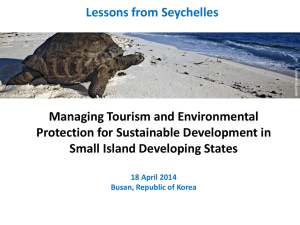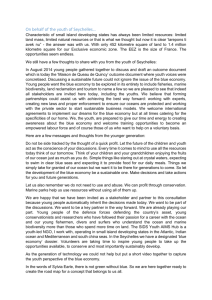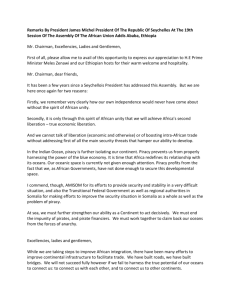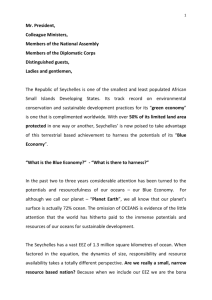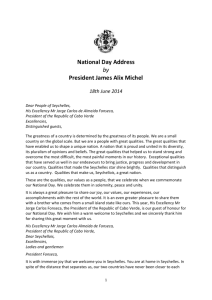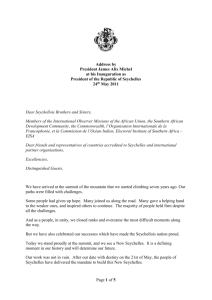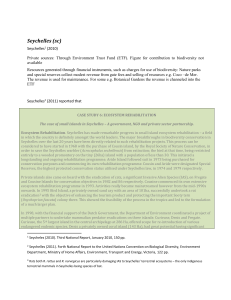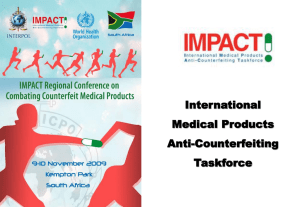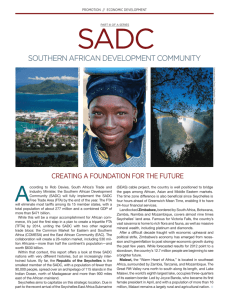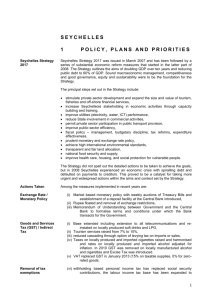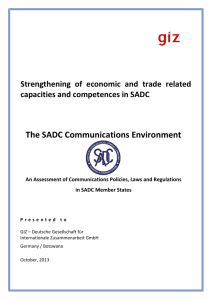Seychelles
advertisement
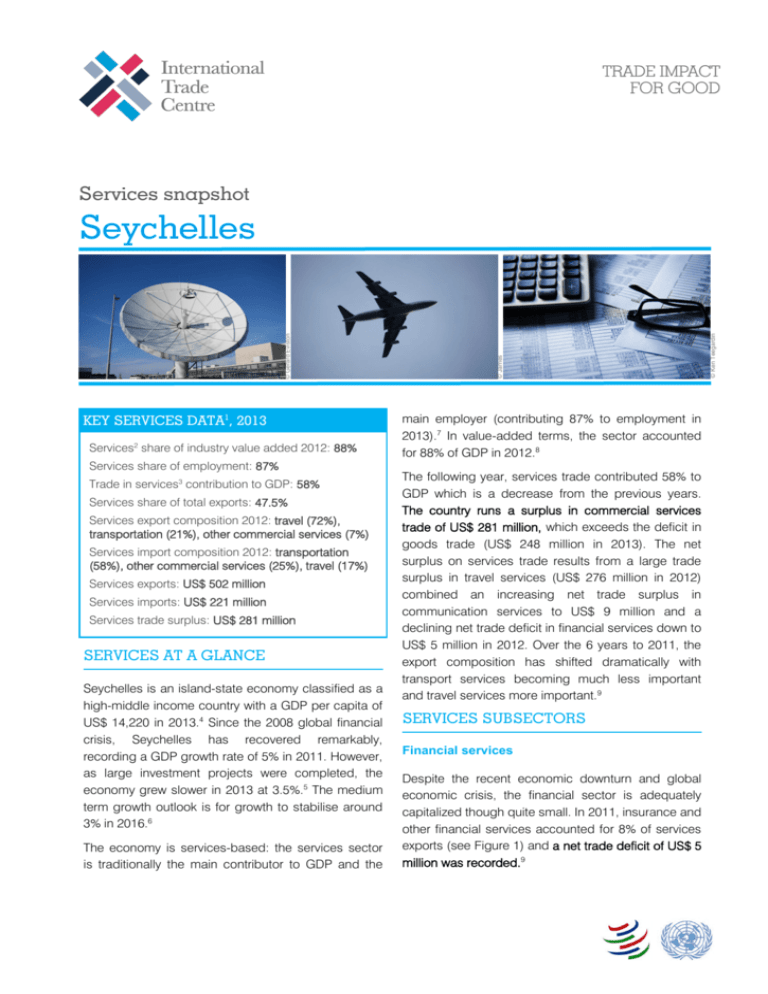
Services snapshot main employer (contributing 87% to employment in 2013).7 In value-added terms, the sector accounted for 88% of GDP in 2012.8 Services2 share of industry value added 2012: 88% Services share of employment: 87% Trade in services3 contribution to GDP: 58% Services share of total exports: 47.5% © shutterstock.com Services export composition 2012: travel (72%), transportation (21%), other commercial services (7%) Services import composition 2012: transportation (58%), other commercial services (25%), travel (17%) Services imports: US$ 221 million Services trade surplus: US$ 281 million SERVICES AT A GLANCE Seychelles is an island-state economy classified as a high-middle income country with a GDP per capita of US$ 14,220 in 2013.4 Since the 2008 global financial crisis, Seychelles has recovered remarkably, recording a GDP growth rate of 5% in 2011. However, as large investment projects were completed, the economy grew slower in 2013 at 3.5%.5 The medium term growth outlook is for growth to stabilise around 3% in 2016.6 The economy is services-based: the services sector is traditionally the main contributor to GDP and the The following year, services trade contributed 58% to GDP which is a decrease from the previous years. The country runs a surplus in commercial services trade of US$ 281 million, which exceeds the deficit in goods trade (US$ 248 million in 2013). The net surplus on services trade results from a large trade surplus in travel services (US$ 276 million in 2012) combined an increasing net trade surplus in communication services to US$ 9 million and a declining net trade deficit in financial services down to US$ 5 million in 2012. Over the 6 years to 2011, the export composition has shifted dramatically with transport services becoming much less important and travel services more important.9 © shutterstock.com KEY SERVICES DATA1, 2013 Services exports: US$ 502 million © Ken Teegardin © James © Gerard Eviston Seychelles SERVICES SUBSECTORS Financial services Despite the recent economic downturn and global economic crisis, the financial sector is adequately capitalized though quite small. In 2011, insurance and other financial services accounted for 8% of services exports (see Figure 1) and a net trade deficit of US$ 5 million was recorded.9 Banking sector is dominated by state and foreign institutions, as plans to privatize state-owned financial institutions have tended to be delayed. There are 8 commercial banks operating in the country holding almost 83% of outstanding government securities and dominating the market. Commercial banks also operate in housing finance, dominated by semi-public institutions. 6 of the commercial banks are foreign owned: Barclays Bank, Mauritius Commercial Bank (Seychelles), Habib Bank Ltd., Bank of Baroda, Bank Al Habib Ltd., Bank of Ceylon. The remaining two are previously state-owned banks that are being restructured: Seychelles Commercial Bank (formerly Seychelles Savings Bank) and Seychelles International Mercantile Banking Corporation (SIMBC) “Nouvobanq”. 10 Figure 2. Financial services share in services trade Figure 3. Communication services share in services trade The number of depositors with commercial banks per 1,000 adults has almost doubled between 2008 and 2012, from 590 to 1,025, while, over the same period, the number of borrowers from commercial banks per 1,000 adults increased by 34% from 116 to 155.5 Two pension funds and 4 licensed domestic insurance companies currently operate in the country; the latter rely heavily on re-insurance from overseas companies. 10 Communication services Despite its geographically isolated position, Seychelles well-developed communications system placing the country among the leaders in the region with regard to Information and Communications Technology (ICT) deployment.11 In 2013, 23 fixedtelephone subscriptions and 147 mobile-cellular subscriptions per 100 inhabitants were recorded.12 Almost 60% of households had a computer, increasing from 25% only in 2010, and 51% had Internet access at home. Half of the population used Internet (50%), making Seychelles the African country with the highest percentage of individuals using Internet. There were 13 fixed (wired)-broadband Figure 4. Transport services share in services trade subscriptions per 100 inhabitants whose prices were below 5% of GNI per capita, whereas the average African fixed broadband price of 64% of GNI.13 There are 2 telecoms providers, Airtel Seychelles and Cable & Wireless Seychelles, and two local Internet services providers: Kokonet and Intelvision.14 Between 2008 and 2012, Cable and Wireless and Airtel, together with the government, funded the construction of the Seychelles East Africa System (SEAS) cable. The SEAS is an almost 2,000 km long submarine fibre-optic cable, linking the country from its landing site in the main island, Mahé, into the existing SEACOM and Eastern Africa Submarine Cable System (EASSy) systems on the African coast.17 With the SEAS cable landing, the international bandwidth almost tripled in 2012.13 Seychelles is a net exporter of communication services. The subsector recorded a trade surplus of US$ 9 million in 2012. In the same year, communication services imports accounted for less than 1% of services imports, whereas the exports share was 2% (see Figure 2).9 Transport services In 2012, transport services recorded a trade deficit (US$ 24 million) for the first time in nearly a decade. Between 2011 and 2012 there was a sharp decrease in the transport services share of total services exports from 30% to 22%. On the other hand, the transport services share of total services imports increased by 11% from 52% to 58% (see Figure 3). This made transport services the largest services import subsector.9 The country has 14 airports.16 The national airline Air Seychelles operates international services. Helicopter (Seychelles) Ltd. provides an inter-island shuttle service and scenic charter flights.17 There are no railways. There are 508km of roads of which, 490 km are paved16; elsewhere the roads are sandy tracks. Public transport means to move around and between islands include buses, taxis and ferries (CatCoco and Inter Island Ferry).18 Water Cruise and cargo ships call at Mahé but there are no scheduled international passenger services. Privately-owned schooners provide regular inter-island connections between Mahé, Praslin and La Digue. Private charter boats operate to the other islands.17 Tourism The tourism sector represents one of the economy key sectors based on the country’s unique biodiversity, cultural richness and wide maritime environment. In 2010, the “Vanilla Islands initiative” was born with the idea to unite the seven Indian Ocean islands – Comoros, Réunion, Madagascar, Maldives, Mayotte, Mauritius and Seychelles – under one tourism brand. This led three years later to the formation of the Vanilla Islands Tourism Organization, backed by the member governments and supported by the United Nations World Tourism Organization (UNWTO). In 2013, Travel & Tourism contributed 56.5% to GDP and this is expected to rise.19 According to AfDB African Economic Outlook 2014, an increase in tourism’s contribution to GDP between 2012 and 2013 was due to a 10% increase in tourist arrivals as Seychelles diversified its markets beyond Europe to new markets in Asia, Eastern Europe and Africa, along with the easing of global financial crisis. Construction of additional resorts and hotels is also a factor anticipating further growth in the short term.20 In 2012, 208,000 international tourism arrivals were recorded. The number of international tourists has been on an upward trend since the establishment of the international airport in 1971.4 The average length of stay per visitor has been consistently recorded at around 10 nights. Approximately 80% of arrivals are international tourists coming from Europe.21 Tourism activities are, after fisheries, the second main source of foreign exchange earnings.19 Tourism is the main employer in Seychelles: according to the WTTC, in 2013, the total contribution of Travel & Tourism to employment, including jobs indirectly supported by the industry, was 56.5% or 24,100 jobs.19 Travel services are the largest service exporters: in 2012 travel services (a proxy for tourism) accounted for 72% of services exports (see Figure 4). The net surplus on trade in travel services has increased every year since 2009.9 Several SIDS have become hosts of offshore financial centres as a result of favourable tax regimes. In the case of Seychelles, foreign investor interest centres on hotels and restaurants, construction, transport and communications.23 FOOTNOTES / SOURCES 1. Key data derived from: UN statistics division – National Accounts Official Country Data, ILOSTAT Database – Labour Force Survey, WTO Trade Profile, ITC Trade Map. 2. The services percentage of industry value added includes construction and utilities. 3. All trade data is for commercial services. Data for all figures derived from Trade Map (ITC, UNCTAD, WTO joint dataset). 4. World Bank – Country Overview, Seychelles. 5. World Bank - World Development Indicators. 6. World Bank – Global Economic Prospects. 7. ILOSTAT Database – Labour Force Survey : annual average for individuals older than 15 years old, employed in the following aggregate economic activities: Construction, Trade, Transportation, Accommodation and Food and Business and Administrative services, Public Administration, Community, Social and other Services and Activities. 8. United Nations Statistics Division – National Accounts Official Country Data. 9. ITC Trade Map. 10. Making Finance Work for Africa – Seychelles : Financial Sector Profile. Available online at: http://www.mfw4a.org/ seychelles/financial-sector-profile.html 11. International Telecommunication Union (ITU) – ITU News – Country focus: Seychelles leads Africa in ICT development, May 2010. 12. ITU – Country profile, Seychelles (2013). 13. Africa Tracking Internet Progress - African internet and broadband facts from ‘Measuring the Information Society 2013′ report (2013). 14. Seychelles News Agency, 2014, “World Economic Forum ranks Seychelles as 2nd best IT centre in Africa”. 15. IX Survey, 2010, “Environment and Social Impact Assessment Study (ESIAS)”, AXIOM, African Development Bank, Seychelles Ministry of Environment, Natural Resources and Transport. 16. KPMG Africa Region 2012/2013 – Country Profile, Seychelles. 17. Pro€Invest, Profit 2007 – Regional Investment Conference Tourism East Africa and the Indian Ocean – Country profile: Seychelles. 18. Seychelles government. 19. World Travel & Tourism Council – Travel & Tourism – Economic Impact 2014: Seychelles. 20. African Development Bank – African Economic Outlook 2014 : Seychelles. 21. Focus : Africa – Country profile : Seychelles. 22. COMESA Regional Investment Agency. 23. UNCTAD, 2014, « Global Investment Trends Monitor – FDI in Small Island Developing States : its Limitations and Potential ». FOREIGN DIRECT INVESTMENT (FDI) Inflows of FDI have been on an upward trend since the 70s but rocketed up in particular between 2004 and 2008 from US$ 38 million to US$ 180 million.5 To reduce the red tape burden in the realisation of projects, in July 2004 the Seychelles Investment Bureau was created.22 In 2013, FDI inflows increased especially in the construction sector.20 The leading investors are from Bermuda, Bahrain, Canada, Germany, Hungary, India, United Arab Emirates and United Kingdom.22 The 2014 UNCTAD report on FDI to 29 of the Small Islands Developing States (SIDS) - among which the COMESA countries Seychelles, Comoros, Mauritius – suggest that FDI is high relative to the size of their economies due to the fiscal advantages they offer. Figure 5. Travel services share in services trade For additional information Contact person: Jane DrakeBrockman, Trade in Services Senior Officer E-mail: drake-brockman@intracen.org Telephone: +41-22 730 0446 Street address: Postal address: ITC, 54-56 Rue de Montbrillant, 1202 Geneva, Switzerland ITC, Palais des Nations, 1211 Geneva 10, Switzerland
